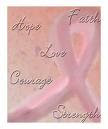(from an article by Patricia Lund, Ph.D.)
As women traverse the breast cancer path, depression is a common companion. For many women, questions naturally arise such as "Am I depressed, or is this a normal reaction to my diagnosis and treatment?" "Am I mentally ill?" "Is what I am feeling due to breast cancer or to chemotherapy or tamoxifen?" "What do I do about these feelings?"
Here, several women discussed the feelings they were experiencing. Common descriptions included not being able to get tasks done, being extremely tired or lacking in energy, having no motivation, crying a lot, not being able to concentrate, feeling that memories and decisions were moving in slow motion, or feeling chronically sleepy. Some complained of difficult adjustments in self image ("I don't know who I am anymore"), that life seemed blurry, like everything was on the other side of a glass curtain, or that life seemed too loose and open-ended, no longer comprehensible. In a colorful turn of phrase, one woman described her brain as feeling like it were made of Swiss cheese.
It is important to distinguish depression from sadness. Depression is much more than just being very sad; there is a deep sense of hopelessness which the depressed person sees as permanent. The person feels cut off from the emotional content of experiences, so that life loses its normal sense of connectedness. A depressed person often cannot remember that things were okay in the past, and may experience truly agonizing emotional pain. There is a distinct quality to clinical depression as compared to normal variations in mood; a loss of the sense of control which can in turn lead to increasing stress. Depression is often accompanied by physiological changes such as disruption of normal sleep patterns or changes in appetite.
In summary, the answer to the question "Can breast cancer lead to depression?" is a clear and unequivocal "Yes". If you suspect you or a loved one is depressed, there are many actions that can be taken. First, see a doctor or a qualified therapist who can provide an objective assessment of the condition. If there is a danger of feeling like ending one's life, it is necessary to obtain immediate help from a physician who specializes in crisis care to avert an irreversible action that is a result of the disease. It is important to carefully check for possible physical causes such as a thyroid condition, side effects of medications or menopausal changes. From this point on, there are many options to pursue including antidepressant medications, psychological counseling or therapy, acupuncture or herbal therapies, nutritional changes, and self-help groups. The important thing to remember is that depression after a diagnosis of breast cancer is normal, treatable, and can even help motivate positive changes in one's approach to and outlook on life.
Friday, February 22, 2008
Thursday, February 14, 2008
Breast Cancer and Music Therapy
There have been studies showing that music therapy can help people who've had cancer to feel less anxious and more relaxed, and to feel less pain.
In a very preliminary 2001 British study of music therapy in 29 cancer patients, participants felt a higher sense of well-being and less tension during one session. Researchers measured improvements in immune function and decreases in the amount of the stress hormone cortisol.
A 2001 study of 20 patients awaiting breast biopsy showed that, when some of the patients had a 20-minute music therapy session while in the pre-operative waiting room, their anxiety and respiratory rates were much lower than those of the patients who did not have a music therapy session.
In a small 1991 study in Utah, 15 cancer patients taking pain-relieving medicines were assigned to receive different kinds of music therapy for 6 days to find out if music could help to further reduce their pain. Results showed pain decreases in 47% of the patients.
In a very preliminary 2001 British study of music therapy in 29 cancer patients, participants felt a higher sense of well-being and less tension during one session. Researchers measured improvements in immune function and decreases in the amount of the stress hormone cortisol.
A 2001 study of 20 patients awaiting breast biopsy showed that, when some of the patients had a 20-minute music therapy session while in the pre-operative waiting room, their anxiety and respiratory rates were much lower than those of the patients who did not have a music therapy session.
In a small 1991 study in Utah, 15 cancer patients taking pain-relieving medicines were assigned to receive different kinds of music therapy for 6 days to find out if music could help to further reduce their pain. Results showed pain decreases in 47% of the patients.
Subscribe to:
Comments (Atom)







